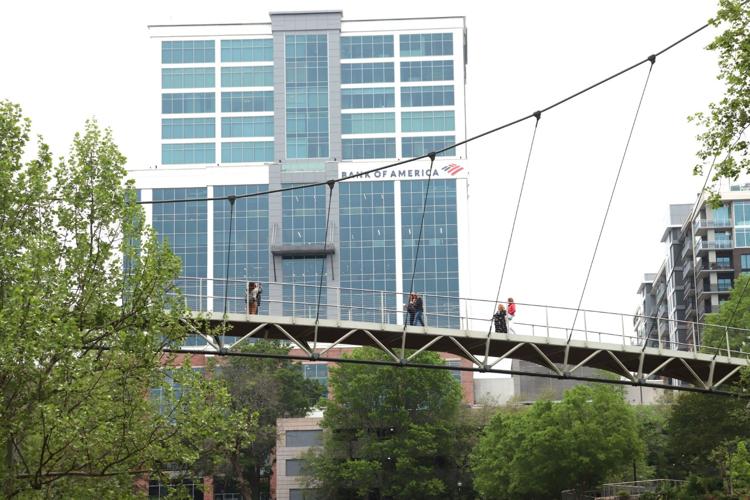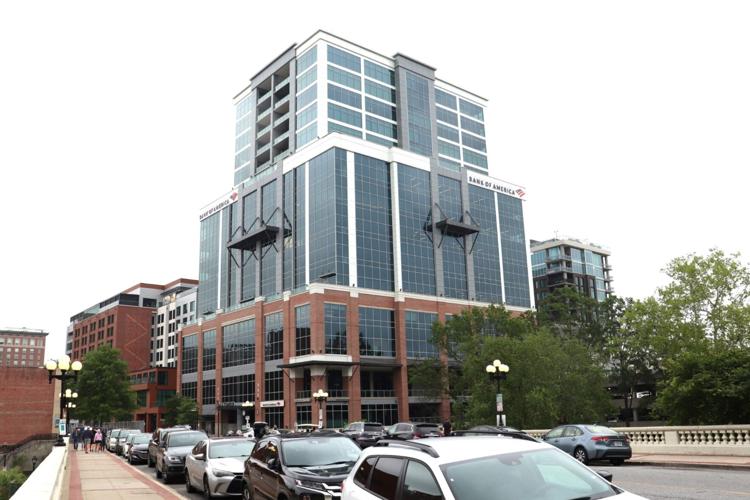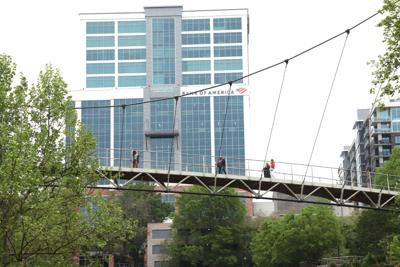GREENVILLE — Heralded by a 17-story tower that looms large over the Reedy River Falls, Camperdown brought high-rise apartments, an upscale hotel and a plethora of retailers to the heart of downtown.
But for all its grandeur, the investment framework behind the transformative development is one that a lawsuit filed this year claimed is riddled with troubled finances and fraud.
The legal complaint pending in Greenville County court accused Camperdown’s main financial backer, WCM Global Wealth, of creating a fraud scheme to prop up nonperforming real estate assets, including Camperdown, which the lawsuit alleged was financially failing.
The complaint claimed that Erik Weir, the founder of WCM, violated his duty as an investment planner when he advised a retired couple to invest their $2.6 million into business entities in which he had a personal financial stake and that Weir knew were financially failing, the complaint alleges.
Attorneys for Kenyon and Cathy Wells, the couple who brought the complaint, did not respond to requests for comment. The attorneys who represent both Weir and WCM declined to comment for this story.
“Due to professional conduct requirements applicable to lawyers, it would be inappropriate for our firm to comment substantively about matters currently before a South Carolina court,” Lane Davis, one of the attorneys representing Weir and WCM, said in a text message.
“We will vigorously defend our clients at the right time and in the right place, which is in the courtroom, not in the media," Davis wrote.
Weir’s attorneys have not filed a full response to the claims in the complaint. They have instead filed a motion to dismiss, asking a judge to first rule on that request before they respond to the allegations.

Falls Tower, which was built as part of the Camperdown development, sits on the Reedy River at the heart of downtown Greenville.
In a letter the Wellses’ attorneys filed with the complaint, Weir characterized Camperdown’s financial issues as part of familiar post-pandemic economic trends and struggles for commercial real estate across the country.
But the complaint alleged those were only part of the financial problems that plagued Camperdown, which transformed prime downtown property into a soaring development that exceeded $300 million.
The entities the Wellses invested in were supposed to hold real estate, but some weren’t actually backed by collateral, the complaint alleged.
Instead, the complaint claimed some of the entities were used to enable a system of intercompany transfers between various operations tied with WCM — all designed to make Camperdown and another endeavor, the redevelopment of the former Bowater building next door, seem financially stable.
Those transfers, the complaint alleged, were enabled by James A. Blair III, the general counsel of WCM, which is based in Greenville. Blair was an integral part of the Ponzi scheme, according to the complaint.
In court filings, Blair’s attorney, Keith Munson, challenged the use of the phrase “Ponzi scheme,” calling it inflammatory. Munson declined to comment for this story.
Who is Erik Weir?
Weir is the founder and principal of WCM Global Wealth, a Greenville-based investment adviser. Its clients include Grammy-winning musicians, celebrities, professional athletes, international clothing designers and families on the Forbes World’s Billionaires List, according to Weir’s media kit.
WCM has $245.3 million in regulatory assets under its management, according to its Form ADV from March 29, a public filing required by the U.S. Securities and Exchange Commission.
Weir is present in the public sphere: He hosts a podcast on which he talks business, religion and other issues with local, national and international figures. Weir presented in February at TEDxUnityPark, an independent Greenville iteration of the global TED talk series.
In Greenville, Weir was previously named to the board of Artisphere, the city’s annual downtown arts festival. He was announced as a donor to Honor Tower at Unity Park in 2022, but city spokeswoman Beth Brotherton told The Post and Courier that Weir later withdrew his donation.
He regularly shares clips from his podcast with his 65,000 Instagram followers, and he has written a book, “Who's Eating Your Pie? Essential Financial Advice that Will Transform Your Life.”
Weir has been involved with marketing for different faith-based movies as well as the Fred Rogers documentary, “Won’t You Be My Neighbor?” and “Soul Surfer,” according to his media kit.
As an investor, Weir has partnered in the development of five Topgolf locations in the U.S. and was partnering to develop more than 20 locations in Europe.
What is Weir’s involvement with Camperdown?
In a city experiencing a flurry of redevelopment projects in recent decades, Camperdown was its biggest prize. The project eventually transformed a 4-acre property at the corner of Main and Broad streets that was the longtime home of The Greenville News.
Plans were first announced in 2014.
At the time, Greenville-based developer Centennial American Properties collaborated with Trammell Crow Co. of Dallas, long considered one of the largest commercial development firms in the U.S., to pursue the project.
But Trammell Crow backed out of the deal in 2015, so CAP stepped in to buy the property.
With that announcement, CAP president Brody Glenn told The Greenville News that Trammell Crow’s concerns included the time it took to secure design approvals from the city. But Glenn said that wouldn't deter him. He was a Greenville native and former chair of the city’s Planning Commission who knew his hometown.

Falls Tower (left) and DECA Apartments (right), as seen from Falls Park, was built at part of the Camperdown development in the heart of downtown Greenville.
Glenn didn't respond to The Post and Courier's request for comment on this story. He and CAP are not defendants in the Wellses’ lawsuit, and they were not mentioned as having taken part in the alleged scheme.
After Trammell Crow left, Glenn reiterated his company’s commitment to the redevelopment. He called Camperdown viable and “the right project for Greenville.” More investors were brought in, led by WCM Global Wealth.
In 2016, construction began, and the buildings were finished in stages. The occasional boom from demolition could be heard in the downtown area.
One demolition was made by Weir, who appeared in a video on Camperdown Greenville’s Facebook in 2019. Before he pressed the button for the demolition, he introduced WCM Global Wealth as the lead source of equity on the Camperdown project.
“I’m most excited about the impact this project is having on our town,” Weir said in the video. “We’re just humbled to see what people have done before we were here, and now, to be here, and to see something that’s an entire city square block, it’s just amazing.”
In 2018, City Council approved an agreement to reimburse CAP about $900,000 for constructing sewer, water and underground utility improvements around Camperdown that the city said would be more cost-effective during construction.
The following year, the city agreed to have CAP build public improvements, including a plaza, as part of construction. The city regularly signs agreements with private companies to attract certain types of development or have more of a hand in shaping the feel of the city.
The agreement with CAP was limited at $20 million, and after construction was finished, the council approved a deal to repay to final costs: $19.8 million in property tax reimbursements over 25 years.
That year, Glenn told the Upstate Business Journal that if not for the agreement, the development would have wrapped around a parking garage and not had a public plaza component.

Camperdown Plaza was built as part of a 4-acre development on the Reedy River in the heart of downtown Greenville, with funding from the City of Greenville.
The city declined The Post and Courier's request for comment on the allegations made against Weir involving Camperdown.
“This is a civil lawsuit between private parties that does not include the City of Greenville," city spokeswoman Beth Brotherton said in a written statement. "Our hope is both parties are able to resolve the matter in a fair and equitable manner."
In December 2020, construction was completed on Falls Tower, the final piece of Camperdown.
Brasfield and Gorrie, the tower’s general contractor, trumpeted the 17-story building as one that would “forever change the skyline” of downtown Greenville. The company thanked its partners: Centennial American Properties, WCM Global Wealth and the city of Greenville.
But in the years ahead, the Wellses’ complaint claims, Camperdown would face mounting debts, and those debts would become the subject of a scheme to repay former investors by soliciting new ones.
How Weir and the Wellses met
Kenyon Wells was on the board of the S.C. Department of Health and Environmental Control and worked in medical technology. He was a major supporter of Nikki Haley’s campaigns for governor.
In December 2021, Kenyon and Cathy Wells attended Gov. Henry McMaster’s holiday party, the complaint said. That’s where they met Weir.
Weir introduced himself and asked Kenyon Wells if he was related to Leo Wells, Kenyon’s older brother. According to the complaint, Weir gave Kenyon Wells a business card and said he would send a copy of his best-selling book, which he did.
The following summer, the Wellses were told to find a new financial adviser because theirs was moving on to other business opportunities. Weir and WCM were recommended to the couple, although the complaint doesn’t say who made that recommendation.
Kenyon Wells, who was 77 at the time, met with Weir throughout the following months to discuss the couple’s financial goals. They wanted their money managed in a tax-conscious way, with balanced risk, liquidity and the opportunity for moderate growth and income through retirement, the complaint said.
Weir gained the couple’s trust, the complaint said, and he said he would act in the couple’s best interests. They decided to bring him on as their financial adviser.
In September 2022, Weir shared investment opportunities with the Wells, and throughout the rest of the year, Weir and WCM liquidated various assets with the Wellses’ permission.
They invested $2.6 million of the couple’s money into real estate promissory notes across four entities, with the couple signing off, according to the lawsuit.
A promissory note is a written promise by one party to pay back a loan or some other type of financing to another party on a set of pre-agreed terms.
How the alleged fraud was carried out
The promissory notes are the nucleus of the complaint, which alleges that WCM, Weir and Blair acted in a conflict of interest by creating a scheme to prop up positions in failing real estate investments that Weir had a personal financial stake in.
Those unsecured, three-year promissory notes allowed interest accrual and allowed the holder to unilaterally extend the call date, according to the complaint.
“No financial adviser thinking of the Wellses’ best interests and seeking to place them in investment vehicles consistent with their investment objectives would have recommended any of the promissory notes into which Weir and WCM placed the Wellses’ money,” the complaint said.
Shortly after the Wellses' promissory notes were made, Weir sent a notice to investors in the South Carolina Strategic Opportunity Fund, the business entity tied with financing Camperdown.
The notice, which was attached as evidence to the Wellses' lawsuit, said that the project’s first mortgage lender had extended the loan maturity date but required additional fees and payments in the millions.
Weir wrote in the notice that rising interest rates, coupled with banks’ increasing reluctance to lend and issues from the COVID-19 pandemic created struggles despite Camperdown being “operationally sound.”

AC Hotel (right) and DECA Apartments (left) were two buildings constructed as part of the Camperdown development in the heart of downtown Greenville.
They were facing an “extremely difficult backdrop” in efforts to refinance the project, he wrote.
“The Project continues to be a best-in-class asset in the Greenville market and is an important component to the Greenville downtown growth plans. The Company will continue to do everything possible to ensure its success,” Weir wrote.
By that point, the project’s appraisals fell wildly as the searing hot real estate market was cooling.
In early 2022, appraisals valued the project, including the new building that The Greenville News had been leasing, at stabilization for about $179 million, Weir wrote. The project was later valued at $145 million.
Weir wrote that management would continue to explore alternatives for the refinance. If that were to fail, they would move to sell the property.
In May 2023, Weir sent another investor update on Camperdown, describing the project as a multi-faceted success but said there was virtually no financing available.
Weir prefaced his letter by saying that a plethora of factors — inflation, “monetary tightening,” working and shopping from home, rising interest rates and bank failures — had created “deeply adverse markets” for commercial real estate nationwide.
The preferred lending member, Trez Capital, had chosen to sell its portion of the project — Falls Tower, Camperdown plaza retail spaces and parking garage — which Weir attributed to the current economic environment.
That decision came despite what Weir wrote was the SCSOF’s request to let markets heal before moving to sell, which he said would result in poor investment performance, if not a near-total loss.
The only way investors could control the outcome, Weir wrote, would be to purchase the lender’s interest outright. That would entail a “very significant additional financial contribution” from SCSOF members and a complete reworking of the debt.
“I am more than happy to pursue this path if everyone is interested,” Weir wrote in the letter. “I wish I had better news, but we are working tirelessly for the most favorable outcome. The economic headwinds are intense and not likely to change for some time."
The lawsuit said that SCSOF has over $60 million in promissory notes, not including accrued interest amounts, and significant debt from several other lenders that significantly exceeds any market value for the project.
“Defendants should have, but did not, tell Plaintiffs the true risk and financial situation represented by the SCSOF promissory notes,” the lawsuit said.
The Wellses also invested in another fund managed by Weir, called SCSOF II, which the lawsuit said is the business entity tied to the redevelopment of the former Bowater building on the Reedy River, next to the Grand Bohemian Hotel.
Around the time the Wellses signed their notes, SCSOF II held $12 million in existing promissory notes and $19 million in bank debt, according to the lawsuit.
The lawsuit alleges the defendants sought to remove their burden of nonperforming loans by issuing new ones, like the promissory notes the Wellses signed, and that WCM and Weir knew or should have known that they would be unable to service the carry.

The former Bowater Building on the Reedy River has been implicated as a potential part of an alleged Ponzi scheme.
At one point in 2023, SCSOF II was negotiating with the city of Greenville to sell the former Bowater building that would become City Hall, but the city pulled out of the sale. Weir wrote in an investor update attached with the lawsuit that SCSOF II decided to sell that property.
Along with the funds tied with Bowater and Camperdown, the Wellses invested in other entities the lawsuit claims were intertwined, including AV Real Estate Fund, among others.
AV Real Estate Fund previously owned Conestee Mill on the southern outskirts of town, which was slated for redevelopment, but sold the property in 2023 to Kanasta LLC, according to Greenville County property records.
The lawsuit claims that AV’s true purpose was to make intercompany loans between entities controlled by Weir, all for the larger purpose of propping up financially struggling assets. Those entities included ones the Wellses also invested in via WCM and Weir.
Where it stands
The immediate financial state of the funds tied with Camperdown and Bowater are unclear.
For Camperdown, the project’s public plaza remains a busy fixture in downtown Greenville. People dance to live salsa music in the plaza as couples enjoy meals on restaurant patios and friends take selfies.
Some property has been listed for sale. The Bowater building, which was emptied ahead of the potential City Hall deal, has office space listed for rent.
As for the Wellses, the lawsuit said they terminated their relationship with WCM. It also claimed they haven’t received all interest payments for various investments they made via Weir and WCM.
Blair’s attorney, Keith Munson, filed a motion to dismiss the Wellses' lawsuit, which said the claims should be tossed because of, in part, the fact that the Wellses also filed a similar claim in a lawsuit against some of the various business entities that are implicated in the complaint against Weir, WCM and Blair.
On Blair's behalf, Munson also filed a response, which alleged that the Wellses represented themselves as sophisticated, accredited investors. Now, the motion claimed, the Wellses regret some investments but not others, and so they’re representing themselves as unqualified.
If they’re truly unqualified, that would mean the couple misrepresented themselves, and they should be prevented from getting relief on those misrepresentations, the motion argued.
Weir and WCM’s attorneys also filed a motion to dismiss the lawsuit. They did not file a response to the Wellses' amended complaint, instead arguing in their motion that they should not have to respond to any requests for discovery or motions until a judge rules on their motion to dismiss.
That motion will proceed to a hearing in June before Circuit Court Judge Alex Kinlaw Jr. The motions made by Munson for Blair will proceed to a hearing in July by Circuit Court Judge Perry H. Gravely.






















